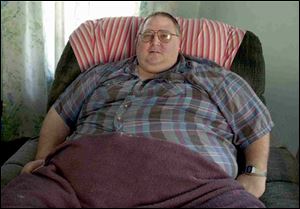
630-pound Clyde man accepts free surgery to battle obesity
11/26/2001
Ron Pocock, 42, says that he inquired about having the surgery in 1997 but that his health insurer would not cover the procedure, and he could not afford to pay the cost himself.
CLYDE - Except for doctor's appointments, Ron Pocock hasn't been out of his house since last Christmas.
Plagued by arthritis, diabetic ulcers, and morbid obesity, the Clyde resident spends his days leaning back in a recliner, watching TV or surfing the Internet on a computer.
Weighing more than 630 pounds, Mr. Pocock becomes exhausted just walking from his living room chair to the bathroom. He can't take a bath by himself or stand long enough to shave in front of a mirror.
“I can't do anything,” he said. “I mean, just the simple chore of going to the bathroom. Once I get there, I've got to catch my breath. Going back, I've got to catch my breath.”
But as another Christmas approaches, Mr. Pocock, 42, may be on the brink of getting his health and life back. Two doctors at St. Vincent's Charity Hospital in Cleveland have agreed to donate the cost of an expensive surgery that will reduce the size of his stomach.
The surgery, a Roux-en-Y gastric bypass, costs between $15,000 and $30,000 and is often not covered by health insurers.
The procedure involves stapling off part of the stomach and connecting the remaining part directly to the lower part of the small intestine. The surgery reduces stomach capacity and reduces the body's absorption of calories.
An anonymous Cleveland benefactor contacted the doctors and persuaded them to help Mr. Pocock.
“It's like an early Christmas present. Totally unexpected,” Mr. Pocock said. “I never expected somebody to reach out that far to help me.”
He said he expects to have the surgery sometime next year but has been told he must get down to 500 pounds or less first.
“In January, we're going to try a liquid diet to try to reach that goal,” he said. “We want to get through the holidays before we start the liquid diet.”
Mr. Pocock said his weight rose steadily through his adult years, despite his best efforts to keep it off through diet and exercise. He said he used to ride his bike to work at the nearby Whirlpool Corp. plant and gained nothing but ridicule for his effort.
“I'd pass people on their front porches, and they'd point and me and laugh,” he said. “And they'd make comments, loud enough so I could hear them.”
By July, 1999, Mr. Pocock had gained so much weight he was forced to leave his job at Whirlpool after 16 years. He supports his wife, Rebecca, and three children with disability retirement payments from Whirlpool and disability benefits through Social Security.
“It covers the bills, and that's about it,” he said. “There's not a lot left over.”
Mr. Pocock inquired about having the surgery in 1997, but his health insurer would not cover the procedure, and he could not afford to pay for it himself.
“Unless you have a lot of money, the average person can't afford to have this surgery done,” he said. “My personal feeling is, it's discrimination against me and everybody else when the insurance companies won't pay for this surgery. If you're a smoker and you get cancer, they'll pay to have the cancer removed by surgery. ... I feel I deserve the same concern as they do.”
Advocates for the morbidly obese are pushing legislation that would require Ohio insurers to cover gastric bypass surgery. Senate Bill 162, introduced in September by Sen. Robert Hagan (D., Youngstown), is in committee, and no hearings have been scheduled.
“Maybe I can be an example for the legislators to see that this does work for people,” Mr. Pocock said. “I can't say this enough: It's not about me. I've had so many calls from people asking how they can help, asking about the surgery, how they can get it. This is for everybody.”
Denise Rasley, a Youngstown-area resident who had the Roux-en-Y surgery in October, 1998, is leading a campaign to get the legislation passed.
Ms. Rasley, 29, said her weight has dropped from 348 to about 165. Previously infertile because of weight-related Polycystic Ovarian Syndrome, she gave birth 15 months ago to a baby girl.
“I lost 180 pounds,” she said. “That's nine bags of dog food. Pick up nine bags of dog food and carry it around all day long without putting it down. That's what my life was like.”